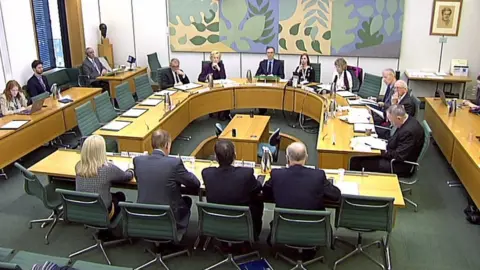Northern Ireland school funding shortage having 'devastating impact'
 Getty Images
Getty ImagesA lack of funding is having a devastating impact on Northern Ireland's schools, the chairman of a Westminster committee has said.
The NI Affairs Committee has carried out an inquiry into education funding.
It concluded that a growing funding crisis in Northern Ireland's schools has led to unmanageable pressures on school budgets.
It also found there was not enough resources for Special Educational Needs and Disabilities (SEND) pupils.
There are around 80,000 pupils with some form of special needs, almost a quarter of the total number of pupils, and a majority of them are educated in mainstream schools.
The committee called for the education budget to be increased to reflect the rising costs associated with caring for pupils with SEND.

The Northern Ireland Affairs Committee launched an inquiry into education funding in August 2018, due to the lack of scrutiny taking place in the absence of an assembly.
It heard oral evidence and received written submissions from principals, schools, unions and sectoral bodies, as well as the Department of Education (DE) and the Education Authority (EA).
The DE resource budget for 2018-19 was £1.98bn, "a 0.6% increase on the previous year's allocation and a reduction in real terms", according to the committee.
It said the department's resource budget for 2019-20 also saw a real-terms cut.
"We recommend that future budget allocations to DE rise not only in line with inflation, but in proportion to the number of pupils in the school system in order to reflect increasing pupil numbers and the associated demand for additional staff," the report said.
'Stagnant teachers' pay'
The committee found:
- individual school budgets had deteriorated. While the numbers of pupils had risen by 2.5% since 2011, spending per head on them had decreased;
- the fragmented nature of Northern Ireland's education systems - with a range of schools across a number of different sectors - led to duplication and did not make the best use of resources. As a result they recommended fewer, better resourced schools;
- the committee also raised concerns about how the EA procures goods and services for schools, saying there is scope for "substantial savings".
It also said teachers in Northern Ireland had seen their pay "stagnate" compared to their counterparts in the rest of the UK and in the Republic of Ireland.
"This is deeply unfair to Northern Ireland's teachers and must be corrected," the report said.
But it said schools could not afford to fund any pay rise and recommended that the secretary of state approve a pay rise, funded centrally by government.
It also called on the secretary of state to take key decisions relating to education in the absence of an assembly.
It recommends, for instance, that if the executive is not reformed by October that Karen Bradley should implement SEND reforms previously agreed by the assembly in 2016.
'Unmanageable pressures'
Simon Hoare MP, who chairs the committee, said schools were facing "unmanageable pressures".
"Stagnant funding is evidently having a devastating impact on the ability of Northern Ireland's schools to provide the education and support their pupils deserve," he said.
"Without an executive or assembly, budgeting challenges have mounted into a crisis."
A spokesperson for the Department of Education said: "The department welcomes the publication of this report and will carefully study all of its conclusions and recommendations."
Maghaberry Primary School principal Graham Gault, who previously told MPs that parents were "donating toilet roll" at his school, appealed to the Northern Ireland secretary to "take it [the report] seriously".
"Our children can bear the brunt of the financial circumstances that our government are imposing on our schools no longer," he said.
"I would beg the secretary of state and our politicians to put our children first."
